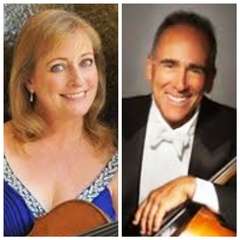|
Back
Quixotic Searches: Ancient and Renaissance New York
David Geffen Hall, Lincoln Center
11/09/2017 - & November 11, 12, 2017
Richard Strauss: Don Quixote (Introduction, Theme, with Variations and Finale; Fantastic Variations for Large Orchestra on a Theme of Knightly Character), Opus 35
Leonard Bernstein: Symphony No. 3 “Kaddish” for Orchestra, Mixed Chorus, Boys Choir, Speaker and Soprano Solo
Tamara Wilson (Soprano), Jeremy Irons (Speaker), Cynthia Phelps (Violist), Carter Brey (Cellist)
Concert Chorale of New York, James Bagwell (Director), Brooklyn Youth Chorus, Dianne Berkun-Menaker (Director), New York Philharmonic Orchestra, Leonard Slatkin (Conductor)

J. Irons/L.Slatkin (© Ora.com/Steve J. Sherman)
“All our great Judaistic personalities ...Abraham...and Moses...and the Prophets all argued with God...The more you love someone, the more you can get angry with them, and when you have a reconciliation, the more close you become. Something like that happens in ‘Kaddish) and it takes an extraordinary actor to perform that.”
Leonard Bernstein (1919-1990)
Leonard Slatkin did indeed have an extraordinary actor to recite Leonard Bernstein’s angry exegesis on the Hebrew prayer for the dead last night. Jeremy Irons’ gorgeous voice had power and beauty, and if that wondrous so plummy voice was hardly Everyman, Leonard Bernstein wouldn’t have objected at all.
Bernstein, whose centennial is being celebrated by “his” New York Phiharmonic Orchestra, was never the common man, and the words he penned in his disputation with God were less a Kafka or a Martin Buber speaking about Man and God, than the “Grand Inquisitor”, actually damning God. (Though Dostoyevsky never ever reconciled himself to Christ: that would have been too childish, too pessimistic, too...well, too un-American.)
The music can wait, for Bernstein was not creating a “symphony” for this Third Symphony. He was attempting a verbal credo, a St. Augustine-style Confessions, a simple (if hardly jejune) philosophy. Taking an elementary verbal rondo–the fawning prayer praising God–and the problems associated with tribal bootlicking in the “real world.”
Where the Kaddish was a formal religious grovel, our Bernstein/Narrator was more informal, almost slangy. The Narrator addresses God as “Angry wrinkled Old Majesty”. (Compare Dostoyevsky’s Inquisitor kissing Christ’s “Bloodless aged lips”.) Where the Kaddish emphasizes Amen–”So be it”–our Narrator emphases “Why be it?”
If only Bernstein had come to the logical answer in his own existential age of anxiety, if only he had said, like Camus, “There is no ‘why’. Don’t even attempt such a quixotic search.”
But Leonard Bernstein, like so many second-generation Jews, was American, and he needed an answer, a resolution. Yankees don’t like mysteries. We like solutions. So God–even a hateful, damning God, the God of the Old Testament– was the answer.
Which musically, in Bernstein’s cosmos, makes a lot of sense. It means that he can end with an inspirational melody, that he can use Schoenberg’s 12-tone scale, though not a system, but a way to show chaos. He can use a lullaby (the dramatically searing Tamara Wilson) and he can use two splendid choirs, one great orchestra, and the always incisive Leonard Slatkin for a performance which, if philosophically wanting, was musically gorgeous.
Just as Bernstein had revised the work several time, Mr. Slatkin made Kaddish more ecumenical by removing the Hebrew lines from the Speaker. (Not that Mr. Irons would have been anything less than rabbinical.) That was a good idea for secular audiences. But of course the Hebrew language, like Arabic, is sacred, a gift from God to his people, each letter magical.
That, though, is insignificant. The English was, as they say in Hebrew, Diyanu, “sufficient.”
More than sufficient. Both the Collegiate Choral and the always pictorial and accurate Brooklyn Youth Chorus were both eloquent and clear. (We could replace the glorification of God to the glorification of directors James Bagwell and Dianne Berkun-Menaker.) So Mr. Slatkin gave us almost a Mahlerian grandeur to this crowning work of Bernstein religious earch. The philosophy may be questionable, but Bernstein’s genius in so many, many, many fields didn’t quite include Rabbi Hillel or Aristotle. So we give our own “Amen” for his blessings on our musical world.

C. Phelps/C. Brey (© music.edu.usc.com/NYPhil.com)
If Bernstein’s search for a “just” God was Quixotic, Cervantes search for a noble man was...well, equally Quixotic. Ergo, Don Quixote. Ergo, Richard’s Strauss’s most pictorial tone poem, Don Quixote, soloed last night by the Phil’s two First Chair stalwarts, cellist Carter Brey and violist Cynthia Phelps.
It was a most appropriate work for the Bernstein Centennial, for this was the initial piece which made the Bernstein “name”, and the program gave some interesting details on that last-minute replacement of an ailing Bruno Walter.
The New York Philharmonic was a bit ragged in their brass solos last night (though the audience sneezes, hacks and coughs were right on time, interrupting the most sensitive solo cello passages). That meant that Carter Brey had two roles to play.
First, as cellist, a mighty, a grand and a most noble eponymous hero. Strauss’s pictures of sheep, monks, peasant girls was a literal phenomena. Mr. Brey allowed the Don’s bravery to come through, not with his usual brilliance, but a sense that this was a character, one of the great characters (along with God) in fiction.
Second, I believe that Mr. Brey was attempting to play Mr. Quixote himself. He looked at the “sheep” coming in from the orchestra, he let himself be tossed down the waterfall, he gazed with gratitude to his viola Sancho Panza, his whole guise was not the cello soloist, but the character in a piece of wonderful theater.
Mr. Slatkin conducted it with a swirl of both emotions and grace. He has always been a knowing conductor, and if both his heroes last night gave a picture of the Quixotic, he was sensible, sensitive and artistically successful.
Harry Rolnick
|